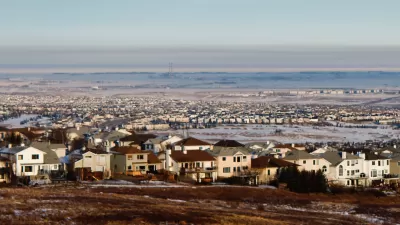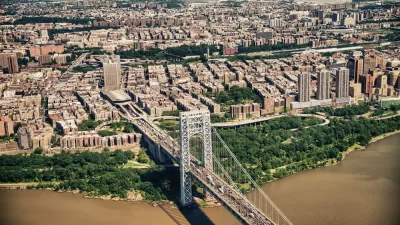An op-ed by the mayor of Calgary, Canada celebrates the adoption of a new off-site levy that will change the financing formula for new development and the necessary infrastructure that comes with it.

Calgary Mayor Naheed Nenshi provides an op-ed for the Calgary Herald to announce the City Council's approval of a new ordinance that enacts an off-site levy. According to Mayor Nenshi, the new law "will fundamentally change how we pay for growth in this city, mostly ending what I’ve been calling a sprawl subsidy."
Mayor Nenshi explains the need for the new law in the broader context of Calgary's growth—130,000 new residents in the past four years—and the extra costs Calgary residents have to cover for infrastructure as a result. To conclude, Mayor Nenshi summarizes the consequences of the new off-site levy:
This means that we have fundamentally ended the development subsidy. For the first time, growth in all parts of the city will now compete on a level playing field, allowing for the market to work and homebuyers to see the true costs of their homes. It also means that, pending further council decision, we will be able to mitigate future increases in your water and wastewater bills.
For traditional reporting on the City Council's approval of the new levy, see an earlier article by Annalise Klingbeil and Trevor Howell.
FULL STORY: Nenshi: We're finally going to stop subsidizing sprawl

Maui's Vacation Rental Debate Turns Ugly
Verbal attacks, misinformation campaigns and fistfights plague a high-stakes debate to convert thousands of vacation rentals into long-term housing.

Planetizen Federal Action Tracker
A weekly monitor of how Trump’s orders and actions are impacting planners and planning in America.

In Urban Planning, AI Prompting Could be the New Design Thinking
Creativity has long been key to great urban design. What if we see AI as our new creative partner?

How Trump's HUD Budget Proposal Would Harm Homelessness Response
Experts say the change to the HUD budget would make it more difficult to identify people who are homeless and connect them with services, and to prevent homelessness.

The Vast Potential of the Right-of-Way
One writer argues that the space between two building faces is the most important element of the built environment.

Florida Seniors Face Rising Homelessness Risk
High housing costs are pushing more seniors, many of them on a fixed income, into homelessness.
Urban Design for Planners 1: Software Tools
This six-course series explores essential urban design concepts using open source software and equips planners with the tools they need to participate fully in the urban design process.
Planning for Universal Design
Learn the tools for implementing Universal Design in planning regulations.
Gallatin County Department of Planning & Community Development
Heyer Gruel & Associates PA
JM Goldson LLC
City of Camden Redevelopment Agency
City of Astoria
Transportation Research & Education Center (TREC) at Portland State University
Jefferson Parish Government
Camden Redevelopment Agency
City of Claremont



























